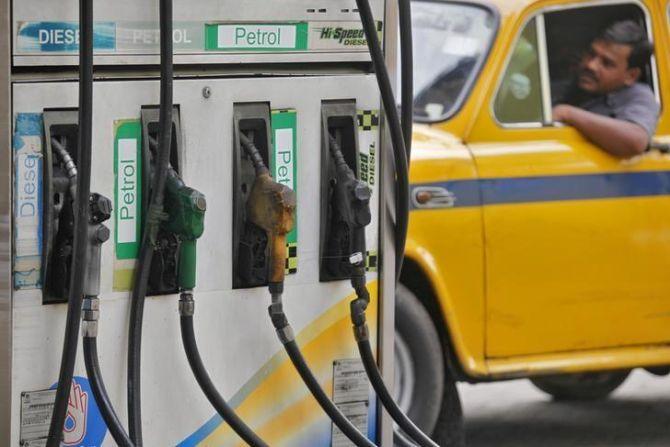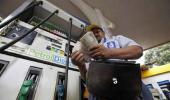'There exists a 'brotherhood' of sorts for a very long time and corrupt dealers and corrupt OMC officials are in it together,' Ashwani Attrish, founder, Empowering Petroleum Dealers Foundation, tells Sudhir Bisht, a veteran of the petroleum industry.

The Empowering Petroleum Dealers Foundation (EPDF) is a forum for the retail outlet (RO, or petrol pump) dealers of the Indian Oil Corporation, Bharat Petroleum Corporation and Hindustan Petroleum Corporation.
EPDF is an initiative of a young RO dealer, Ashwani Attrish, who operates dealerships in western Uttar Pradesh.
The older dealer associations like the Federation of All India Petroleum Traders, Consortium of Indian Petroleum Dealers and All India Petroleum Dealers Association, are arguably the bigger associations, but have remained inactive most of the time except when the dealers are itching for an upward review of their commissions on sales.
EPDF is a vibrant body that has met over five times in the last one year. The EPDF motto is very simple. Punish the dealers who indulge in malpractices, by all means. But don't spare the oil company officials and their OEM vendors (who supply and maintain the dispensing pumps) and the transporters who deliver fuel at the RO doorsteps and pilferage fuel in transit.
I have interacted with Ashwani and his close associates on several occasions and found out that they are not merely interested in the dealer margins but their focus is mainly on harmonising the relationship between the PSU oil companies (called OMCs, or oil marketing companies) and the dealers keeping the customers's interest at the top of their priorities.
The OMC dealers have been demanding that OMCs should enforce a system that uses the M2M and IOT technologies so that the customers who visit the petrol pumps get the right quantity and quality of fuel.
They believe that the tendency of OMCs to put the entire blame on dealers in case of malpractices in the petroleum retail trade is unfair.
EPDF believes it is important to establish a network operating centre that will seamlessly record all transactions at the oil terminals and will monitor the illegal activities during the transportation of fuel from oil terminals to the dealers's premises.
EPDF believes that malpractices in retail trade can't take place without the active connivance of the OMC officers.
It may be recalled that the massive scandal that came out in respect of the short delivery of fuel at many outlets in Uttar Pradesh led to cancellation of many dealerships. But none of the OMC officials were penalised or even interrogated by the police.
EPDF had not supported the dealers who were allegedly caught cheating customers (by installing remotely operated devices that manipulated deliveries of petrol pumps). But at the same time, EPDF also demanded that the role of OMC officials too needed to be probed.
I met with EPDF founder Ashwani Attrish, below, a few times and sought his views on the number of issues that involve the petroleum trade in India.
(A few abbreviations used: MS = Motor spirit of petrol; HSD = High Speed Diesel or Diesel: KL= Kilo litre or 1,000 litres; OMC = Oil Marketing companies)
This is the first time in almost four years that allotment of petrol pump sites is being advertised. Ahead of general elections, public sector oil companies plan to allot about 65,000 petrol pumps across the country to nearly double the existing retail network.
Indian Oil, Bharat Petroleum and Hindustan Petroleum recently issued advertisements to set up 55,649 petrol pumps across the country.
India currently has 63,674 petrol pumps, most of them with public sector firms.
Nayara Energy Ltd, formerly Essar Oil Ltd, has the highest number of outlets in the private sector at 4,895 while Reliance Industries has 1,400 pumps. Royal Dutch/Shell has 116 outlets.
Your comments on this unprecedented announcement.
Given that India's per capita consumption of petroleum products is among much lower than most developed countries, this blitzkrieg is mindlessly inexplicable.
I think that no empirical study was conducted by the three public sector companies when they came up with such an advertisement. It is more of a knee jerk, political announcement.
The sycophants at the ministry of petroleum and natural gas may have given this idea to the top leadership without looking at the fact that there are hardly any plots of land available on the highways and among the cities to ensure such a massive expansion of the RO network.
Moreover, no RO-wise feasibility was carried out that could justify nearly doubling the number of outlets when the trade is showing single digit growth.
 EPDF welcomes competition, but with fairness.
EPDF welcomes competition, but with fairness.
Sadly, the general public doesn't comprehend the current business model where the capital cost employed is around Rs 2 crore (Rs 20 million) on an average and it takes anywhere between 20 and 25 years to recoup it, that too if the sales is at least 100 kl per month. Many outlets have average sales of 50 to 80 kl/month.
The OMCs will definitely dispute this fact, but will not share the data to counter our stand. We are ready for a debate on this with the OMC officials.
The average throughput of PSU outlets per month is between 150 to 180 kl. Essar is doing almost 40% less than PSU ROs and RIL is doing considerably better, some say 50% better than PSUs in terms of throughput per RO.
What are the current PSU margins on MS and HSD?
I am referring to average throughput of most ROs. It is around 50 to 80 kl. The margins barely allow business continuity and survival.
You would notice here that while the demand for petroleum products is going up in single digit year on year, the OMCs are trying to increase the number of ROs by almost 80%. Isn't there something amiss here?
At what volume can an RO dealer break even?
At 80 kl petrol and 70 kl diesel on an average.
Do you think doubling the sales outlets will be detrimental to the profitability of most outlets?
Yes, it would reduce the profitability of most outlets considerably.
Last year many PSU outlets (even 'Pure for Sure' ROs) were found to have a remote mechanism for manipulating deliveries. I think the dealership of nearly 30 dealers have been cancelled. Many dealers and their key staff are in jail.
Can such a big malpractice happen without the active involvement of oil company officials?
Almost 100 in Uttar Pradesh were terminated. All government-owned oil companies were badly affected.
ROs as old as 65 years were indulging in gross cheating!
The OMCs purposely didn't implement the clause of legal metrology that says that the dispensing units should be non-tamperable.
OMCs are the sole and absolute owners of dispensing machines and they maintain this infrastructure and yet they put the blame on dealers.
In the case of large scale malpractice of short delivery that you are referring to, it was I who informed the hon'ble high court about the responsibility of oil companies in this scam/loot in active connivance with dealers and other officials.
The dealers (now sacked) and their employees are out on bail, but none of the officials was ever arrested.
The conniving OMC bureaucracy was actively involved, but remains unaccountable to date despite their suspension/termination orders in place by their respective vigilance departments.
The competent authority of each OMC is keeping its lips sealed lest the skeletons tumble out.
Some field officers say many dealers are part of the infamous mafia that exists. Field officers fear for their lives and hence don't report malpractices. What's your candid view?
There is some level of active connivance. There exists a 'brotherhood' of sorts for a very long time and corrupt dealers and corrupt OMC officials are in it together.
The young and new field officers join the party under the guidance of their senior managers. The young officers don't want to take an idealistic stand as they fear adverse appraisals.
A few dealers sell short as they are the first victims of short-supply at their outlets.
The price of the malpractices of pilferage of petroleum products during the transit, from OMC depot to the dealer premise, is rampant.
And the dealer is the one who pays for these thefts from his margins.
The greed part is there too, but to single out dealers alone is unfair.
In an era of IOT (Internet Of Things) why can't the pumps just stop functioning if they are tampered with?
You may not know that the director, legal metrology department, Government of India, relaxed the rules that govern the dispensing units. It was done in the case of an MNC manufacturer in the first stage verification of the dispensing units.
These units were exempted from the condition that should have ensured that these were tamper-proof.
Is this not a clear case of connivance?
You head a recently formed but an influential group of dealers and you are at the forefront in taking up cudgels on behalf of dealers. What are your main objectives?
Is it just to shield the dealers from oil companies and weights and measures department?
I believe you are unpopular with a section of oil company officers and your own outlet's commissioning was delayed due to your assertive stands on matters of principle.
The Empowering Petroleum Dealers Foundation aims to empower the dealer fraternity across India without any inhibitions and strings attached.
We are not here to protect corrupt dealership practices, but we also want the entire chain of corruption eliminated.
Corrupt officials and corrupt contractors who maintain pump units should be punished too.
The OMCs should be end-to-end responsible for product quality and quantity.
Let the stocks in our tanks be completely owned by OMCs. They should put a comprehensive system that can be remotely monitored and any malpractice that takes place should be easily detectable.
In an era of IOT, this is possible, but the onus is on OMCs to ensure that such a system is put in place.
My retail outlet commissioning was affected as I was categorical that the dealership licence agreement is followed to a 'T'.
My RO commissioning was delayed by two years as I insisted that while I as a dealer would do my part, the company as the principal should do its part too.

Quality and quantity remains an issue when it comes to fuel services at the retail level.
Inadvertent, stray cases of adulteration can occur at the PSU depots, but it is never by design and this happens at rarest of rare instances.
I believe that adulteration is an act of public defrauding and this happens between the transporters and dealers.
The PSUs are supposed to give delivered supplies and they do so, but most dealers transport their own products.
So shouldn't the charge of adulteration of fuel rest squarely with the dealers?
This aspect is governed very clearly by the MS HSD (Regulation of Supply, Distribution and Prevention of Malpractices) Order, 2005 and there are applicable clauses in the dealership licence agreement and the Marketing Discipline Guidelines, 2012.
When a RO dealer becomes a transporter, s/he is separately governed by a commercial contract and Industry Transport Disciple Guidelines, 2016.
If you recall, the Centre for Society and Environment uncovered a massive scam in the early 2000s on this nexus between the corrupt OMC officials, transporters and dealers, but sadly all was hushed and this malady of adulteration continue to plague the industry albeit in some pockets.
A massive pilferage racket is under investigation by the CBI involving Bhatinda HPC terminals.
Recently, IOC terminated a major transport transportation contract at Ratlam, MP. In December,
I personally intervened at Gwalior when the territory manager of an OMC threatened termination of licence as the dealer refused to decant a tank-truck that wasn't carrying supplies for his outlet.
I am quoting the above cases to illustrate that OMC officials have a huge responsibility in ensuring that the product that reaches outlets is pure and isn't pilfered by the transporters.
The dealer has no role in tank filling at the OMC depot and has no role in transportation of product from depot to the outlet.
Sadly, there exists a nexus between the conniving depot bureaucracy and the transporters and it is very strong.
They will go to any length to ensure that all blame for short supply and adulteration is put at the dealer's doorsteps at all times.
Why do you think PSUs are not able to use the advances made in information technology and in remote monitoring systems to keep the end-to-end supply chain adulteration free?
Similarly, the short delivery issue can be easily tackled by hourly inventory reconciliation by use of IT.
All it needs is a RO monitoring system just as telecom companies are doing at the cell sites. It will hardly cost a paisa per litre.
Absolutely! The technology interventions will certainly change the game and eradicate corrupt practices.
End-to-end automation is the key to safeguard consumer interest, but the OMCs for reasons that can only be called inexplicable have done nothing much to move in this direction and stem the rot.
There could be several reasons for this. First could be a state of inertia that prevails in this sector.
OMC officials may not have a strong incentive to do anything that needs a lot of investment in terms of their time and energy.
A section of the bureaucracy that may be corrupt may not like to promote any new technology that would stop the malpractices.
Another key reason is that most OMC officials are simply not aware of their roles and responsibilities in ensuring the quality and quantity aspect of this trade. They think that the buck would stop at the dealer always.
And sadly, even the dealers aren't aware of their rights. They just buckle under pressure and aren't united in demanding a system of despatch, transportation, delivery and dispensation that is tamper-proof.
I believe that a private player has started door delivery of petrol. Is it legal?
They haven't! Some illegal entities had mushroomed in cities like Bangalore etc, but have been curbed by PESO, the Petroleum and Explosives Safety Organisation.
I have one request to make to you. Please emphasise our motto, that we want to make petroleum trade free from all malpractices.
I invite all suggestions from all dealers and customers vide our twitter handle @empoweringdlrs @EPDFIndia @ashwaniattrish and I thank Rediff.com for this opportunity.
Sudhir Bisht, PhD, author and columnist, tweets @sudhir_bisht









